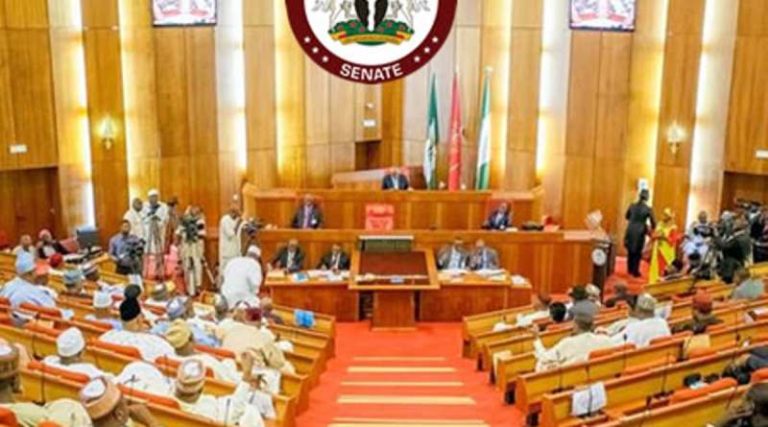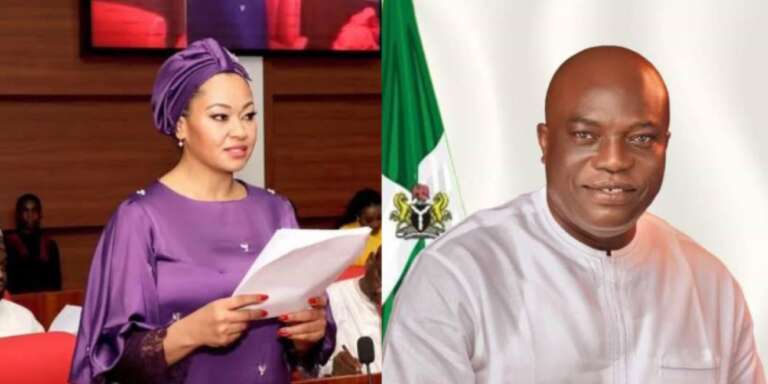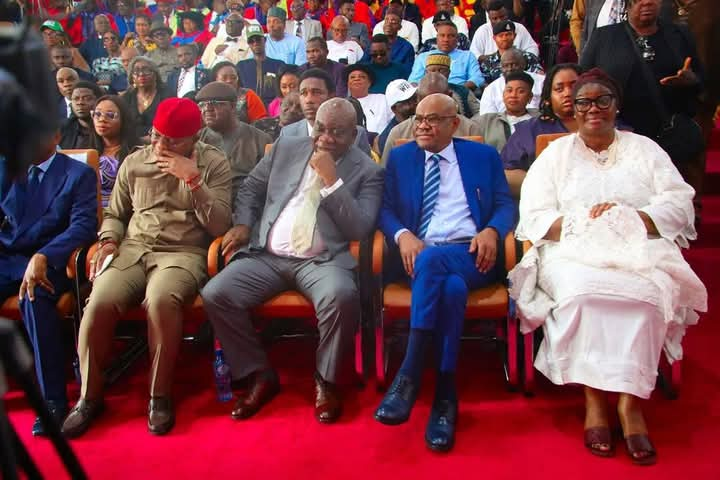- Alleges that the Court of Appeal plans to make an order today to ensure Aminu Ado Bayero holds a hitch-free Durbar
I am reliably informed by sources within the Court of Appeal of plans by some people to procure an order of the same Court of Appeal on Tuesday, 25 March 2025 to enjoin the security authorities in Kano to ensure co-operation with and protection for the Durbar proposed by Aminu Ado Bayero.
Professor Chidi Odinkalu has discredited a statement issued by Dr. Festus Akande, the Supreme Court’s Head of Communication which defended Justice Emmanuel Agim’s attendance at the University of Calabar’s 50 anniversary.
Odinkaku in a statement made available to Law & Society Magazine remarked that: “The fact that Festus Akande considered it essential to issue the statement itself shows that something was wrong with that event in Calabar.”
Citing Rule 2.8 of the Revised Code of Conduct for Judicial Officers in Nigeria (2016) which provides that: “A Judge shall avoid developing excessively close relationship with frequent litigants – such as government ministers or their officials, municipal officials, police prosecutors in any Court where the Judge often sits, if such relationship could reasonably create an appearance of partiality,” Odinkalu noted that: “Neither Festus Akande nor, indeed, Justice Emmanuel Agim as a Justice of the Supreme Court can pretend to be unaware that Nyesom Wike is the most prolific current political litigator in Nigeria.”
According to the law professor and rights advocate: “Aminu Ado Bayero, the Chancellor who conferred the honorary degree on the Minister of the FCT, is seeking to claim benefit of a curious, incongruous and improbable order of the Court of Appeal panel which included the wife of the Minister. As I write, the panel has yet to release the text of the reasoning on which it issued its orders.
“Justice Emmanuel Agim is the author of a curious, incongruous, and inexplicably unprecedented decision of the Supreme Court in favour of satraps of the same Minister in the political contest in Rivers State.
“This context makes the optics of that particular occasion in Calabar an awful advertisement for high subversion of the values of judicial independence and democracy, around whose flags Festus Akande sought to wrap his defense of the indefensible. Even worse, these facts create a credible perception of network transaction in judicial orders.”
Read the full text of the statement below.
As part of its golden jubilee, the University of Calabar is said to have held a special convocation ceremony on Saturday, 22 March, 2025 where it handed out honours to all manner of persons. The Chancellor of the University is Aminu Ado Bayero, the deposed Emir of Kano. Present at that event also were Nyesom Wike, Minister of the Federal Capital Territory and Nigeria’s most prolific political litigant; as well as Justice Emmanuel Akomaye Agim, a senior Justice of the Supreme Court who delivered the leading decision in the recent judgment of that court concerning the withholding of the federal allocations of the Rivers State Government.
Images of the events in Calabar putting these major actors in contemporary politics of the Nigerian judiciary in close propinquity with one another have gone viral. In response, Festus Akande, Director of Information and Public Relations at the Supreme Court issued a public statement on Monday, 24 March, 2025, in which he felt compelled to claim that Emmanuel Agim attended the convocation “as an esteemed honouree and an alumnus of the institution, whom the Governing Council had found worthy to be conferred with an Honorary Doctorate Degree in Law (Doctor Honoris Causa). He was recognized for his significant contributions to the legal profession; which is a reflection of his commitment to justice, integrity, and the rule of law, serving as a model for aspiring legal professionals and students alike.”
Mr. Akande’s statement further claimed that “Emmanuel Agim’s participation at the ceremony was independent and not as an official representative of any government ministry or department, let alone accompanying any serving or retired government official”, before asserting that “any insinuation to the contrary is not only inaccurate but undermines the judicial independence that is crucial to our democracy.”
These claims are made in the name of the Supreme Court and in pursuit of high-sounding goals of judicial independence and democracy.
The Supreme Court is a public institution embodying the highest judicial authority in the Federal Republic of Nigeria.
Judicial independence is a high constitutional principle ordained for the protection of judicial authority as a public trust. It is not a self-serving shibboleth.
In terms of Nigeria’s constitution, the source of democratic legitimacy resides in the people alone.
To leave Festus Akande’s claims uncontested or without a response, therefore, is to diminish the high authority of the Supreme Court, the service of the distinguished men and women who have laboured to give it its historically high standing in the public imagination until recently, and the high principles of judicial independence and democracy instituted for the protection of the peoples of Nigeria.
This statement is issued out of concern to stem the heedless haemorrhaging of the rarefied authority of the Supreme Court of Nigeria. In this spirit, it is essential to set the records straight, even if ever so briefly.
The Applicable Standards
The fact that Festus Akande considered it essential to issue the statement itself shows that something was wrong with that event in Calabar. In case he needs reminding, Lord Chief Justice Hewart laid down the applicable standard for judging judicial impartiality and independence in 1923 in R. v Sussex Justices, Ex Parte McCarthy, (1923) All ER 233, to the effect that: “Nothing is to be done which creates even a suspicion that there has been an improper interference with the course of justice.”
That event in Calabar was rich with pictures to support suspicions of improper interference with the cause of justice.
Rule 2.8 of the Revised Code of Conduct for Judicial Officers in Nigeria (2016) is very clear: “A Judge shall avoid developing excessively close relationship with frequent litigants – such as government ministers or their officials, municipal officials, police prosecutors in any Court where the Judge often sits, if such relationship could reasonably create an appearance of partiality.”
In Buhari vs. Independent National Electoral Commission & Ors (2008) LPELR-814(SC) at PP.145-146, Justice Niki Tobi of the Supreme Court admonished judges to “maintain a very big distance from politics and politicians” warning that:
“….the two professions do not meet and will never meet at all in our democracy in the discharge of their functions…. Their waters never meet in the same way Rivers Niger and Benue meet at the confluence near Lokoja. If they meet, the victim will be democracy most of the time, and that will be bad for sovereign Nigeria.”
In his memoirs, Faces, Cases and Places, published in 1983,(p.78), former Chief Justice of Nigeria, Atanda Fatayi Williams, said:
“In Nigeria, familiarity does not breed contempt. It breeds obligation. As a result, people with whom you are friendly expect you to bend the rules to suit their requirements. It pays in the end for a judge, even at the risk of being accused of being a snob or of haughtiness, to be somewhat aloof, not only from members of the Executive but also from political powerbrokers.”
Neither Festus Akande nor, indeed, Justice Emmanuel Agim as a Justice of the Supreme Court can pretend to be unaware that Nyesom Wike is the most prolific current political litigator in Nigeria. To justify public fraternizing with him by a Supreme Court Justice is to licensing the accessorizing of judicial officers for political purposes.
The Context: Nyesom Wike & Emmanuel Akomaye Agim
On the last day of February 2025, the Supreme Court delivered judgment in the consolidated appeals in SC/CV/1174A/2024 et al, Rivers State House of Assembly & Anor vs. The Government of Rivers State & 9 Ors. The case sought orders of the court to, among other things, require the Central Bank of Nigeria to withhold the federal allocations of the Government of Rivers State until the passage of a budget by a faction of the State House of Assembly. At the time, the question of the right of that faction of the State House of Assembly to function as such was the subject of litigation before lower courts in FHC/PHC/CS/2024 Oko-Jumbo & 2 Ors vs. Martin Amaewhule & Ors (pending in the Federal High Court in Port Harcourt since April 2024).
The case seeking to withhold the federal allocations of Rivers State was unrelated to this appeal. Delivering the judgment of the Supreme Court on 28 February, Emmanuel Akomaye Agim framed two issues for determination neither of which had anything to do with the issues pending before the Federal High Court. Yet, without an appeal from that case before it, the court purported to determine the issues then pending before the Federal High Court on the question of the defection of the 27 members of the Rivers State House of Assembly from the platform on which they were elected (the Peoples Democratic Party, PDP, to the All Progressives Congress, APC). Even though the issue of the defection of the 27 members of the Rivers State House of Assembly did not arise in the appeal, the Supreme Court raised it by itself and shockingly decided a case that was still pending at the High Court.
This course of action has no precedent in Nigeria’s judicial history. It is the first in the history of Nigeria that the Supreme Court will take over a case that is pending in the Federal High Court. Unsurprisingly, counsel to the 27 legislators promptly applied to the Federal High Court in Port Harcourt asking it to dismiss the case on the ground that it has become academic on the basis that the Supreme Court has decided the matter while it was still at the Federal High Court. The Port Harcourt judicial division of the Federal High Court will render its judgment on this application on 20 April, 2025.
The Context: Nyesom Wike and Aminu Ado Bayero
On 14 March, 2025, a three-judge panel of the Court of Appeal sitting in Abuja in Appeal No., CA/KN/27/M/2025, Alhaji Aliyu Babba Dan Sarki Dawaki Babba vs. Kano State House of Assembly & 7 Ors, granted a “Mandatory Injunction” (not a stay of execution) arresting the enforcement of the judgment of the same Court of Appeal on 10 January 2025 in Appeal No. CA/KN/126/2024, Kano State House of Assembly & Anor vs. Alhaji Aminu Babba Dan Agundi & Ors. The earlier judgment of the Court was delivered by a panel led by Justice Gabriel Kolawole, a Justice of Appeal since 22 June, 2018. The latter decision arresting that judgment was given by a panel led by Justice Okon Abang, a Justice of the Court of Appeal since 20 September 2023. Other members of the latter panel were Justice Eberechi Suzette Nyesom-Wike (Justice of the Court of Appeal since 10 July 2024) and Justice Oyejoju Oyewumi (Justice of the Court of Appeal since 10 July 2024). This panel of the Court of Appeal included the wife of the Minister of the FCT, Nyesom Wike.
In terms of seniority in the Abuja division of the Court of Appeal, Justice Okon Abang is no. 6 out of 10; Justice Nyesom-Wike is No. 9; and Justice Oyewumi is the last. It is unprecedented for a panel this junior to be constituted to sit upon a decision of a much more senior panel of the Court of Appeal. It is equally notable that the President of the Court of Appeal has unilaterally moved this case to Abuja from Kano.
The subject matter of this appeal is a fundamental rights claim by a disaffected king-maker in respect of the stool of the Kano Emirate from which Aminu Ado Bayero was deposed. The Court of Appeal in Kano had denied that claim, holding that the Federal High Court had no jurisdiction over essentially chieftaincy matters.
Following this decision, Aminu Ado Bayero, who is not a named party in the case, notified the security services in Kano of his intention to hold an Eid-El-Fitr Durbar at the end of the holy month of Ramadhan. I am reliably informed by sources within the Court of Appeal of plans by some people to procure an order of the same Court of Appeal on Tuesday, 25 March 2025 to enjoin the security authorities in Kano to ensure co-operation with and protection for the Durbar proposed by Aminu Ado Bayero.
Meanwhile, on Monday, 24 March 2025, the Supreme Court entered an appeal against the ruling of the Okon Abang-led Court of Appeal panel as Appeal No SC/CV/279/2025. This should ordinarily preclude the Court of Appeal from further engagement with the subject matter but these are no ordinary times and no one can say what could happen
The Optics
Aminu Ado Bayero, the Chancellor who conferred the honorary degree on the Minister of the FCT, is seeking to claim benefit of a curious, incongruous and improbable order of the Court of Appeal panel which included the wife of the Minister. As I write, the panel has yet to release the text of the reasoning on which it issued its orders.
Justice Emmanuel Agim is the author of a curious, incongruous, and inexplicably unprecedented decision of the Supreme Court in favour of satraps of the same Minister in the political contest in Rivers State.
This context makes the optics of that particular occasion in Calabar an awful advertisement for high subversion of the values of judicial independence and democracy, around whose flags Festus Akande sought to wrap his defense of the indefensible. Even worse, these facts create a credible perception of network transaction in judicial orders.
The 50th anniversary convocation of a university is not an emergency event. The parties who met in Calabar had to have had notice of that event long before the dates of the judgments or rulings in the cases in which their interests interlocked. There was ample time, if they desired, to make alternative arrangements. Their decision to proceed in the manner they did without any regard to the optics or possible damage to the standing of the judicial institutions serves neither judicial independence nor democracy. Instead, it showcases a peculiar brand of hubris and impunity at the desecration of those high constitutional values.//ENDS













